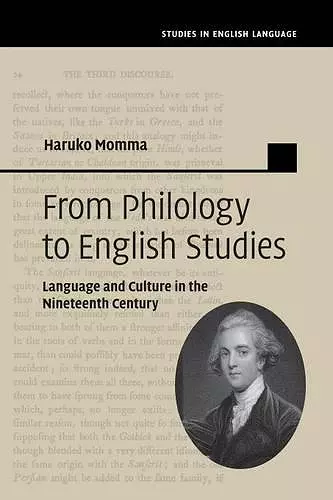From Philology to English Studies
Language and Culture in the Nineteenth Century
Format:Paperback
Publisher:Cambridge University Press
Published:26th Mar '15
Currently unavailable, and unfortunately no date known when it will be back
This paperback is available in another edition too:
- Hardback£104.00was £104.00(9780521518864)

An exploration of how philology contributed to the study of English language and literature in the nineteenth century.
An examination of the influence of nineteenth-century philology on European thought. Haruko Momma considers, among other matters, the impact of William Jones's discovery of Sanskrit on historical studies of language and culture, the Philological Society's role in the making of the OED, and the rise of English studies at universities.The study of English language and literature in Britain changed dramatically between the end of the eighteenth century and the beginning of the twentieth. From Philology to English Studies explores the contribution of philology to this movement. Haruko Momma charts both the rise and fall of philology from antiquity to the late eighteenth century, and the impact of modern philology on the study of modern languages and literatures. Focusing in detail on the work of key philologists in the nineteenth century, Momma considers how they shaped European discourse and especially vernacular studies in Britain: William Jones's discovery of Sanskrit in British India gave rise to Indo-European studies; Max Müller's study of this same language helped spread the Aryan myth to the English-speaking world; the OED achieved its greatness as a post-national lexicon under the editorship of James Murray, a dialectologist originally from Scotland.
'Critics have been advocating a 'return to philology' for decades. Leave it to Haruko Momma, a real philologist, to offer an erudite and fluent history of the discipline and a powerful claim for its endurance. She locates the origins of our contemporary teaching of literature in the traditions of Indo-European linguistics, English and German university scholarship, and American academic culture. From Philology to English Studies is the best critical engagement with the historical study of language - its institutions, ideologies, and idioms - since the groundbreaking studies of Hans Aarsleff nearly fifty years ago. It will be valued for as long.' Seth Lerer, Dean of Arts and Humanities, University of California, San Diego
'Momma presents a fascinating history of the golden age of English language studies - or 'philology' in its many senses. In moving among continental Europe, India, and England, the story that emerges is animated by the powerful personalities of scholars like William Jones, Jacob Grimm, James Murray, Max Müller, and Henry Sweet. The publications they produced and the institutions they shaped continue to leave their mark on us all: one need think no further than the Oxford English Dictionary and the current place of English studies within the university to get a sense of their impact. While many of these luminaries are already widely known anecdotally (such as Henry Sweet, for example, as the model for Shaw's Dr Doolittle), Momma draws together their overlapping careers in a compelling, coherent account like no other.' Daniel Donoghue, John P. Marquand Professor of English, Harvard University
'Momma's well-researched and crisply written book illuminates important episodes in the history of English philology. Much of the pleasure in reading the book comes from reading the early philologists in their own words through the abundant quotations Momma provides. These philologists can indeed turn a phrase, and their prose is often humorous, even snarky, as in the cases of Jones and Kemble. One notices how lively, as well as learned, discussions about philological issues were.' Corey J. Zwikstra, The Linguist List
ISBN: 9781107515611
Dimensions: 230mm x 153mm x 13mm
Weight: 450g
242 pages